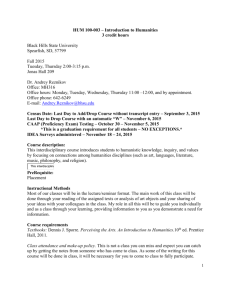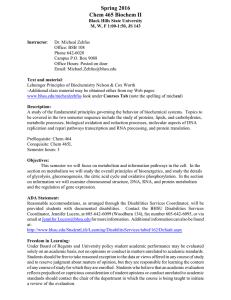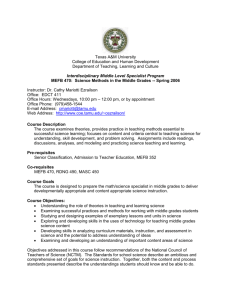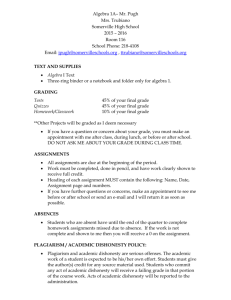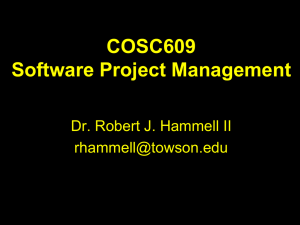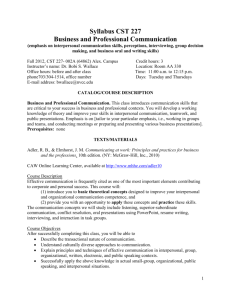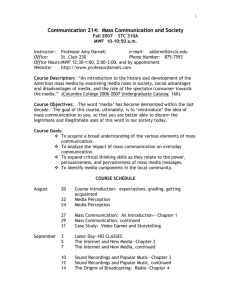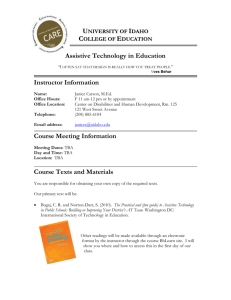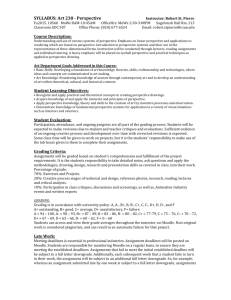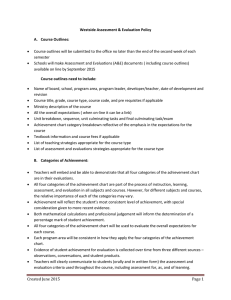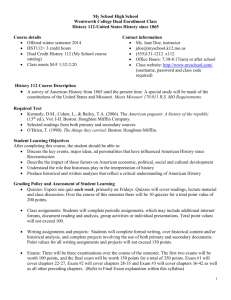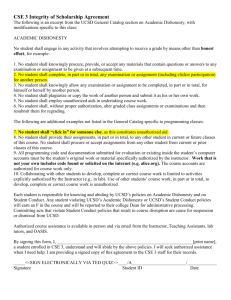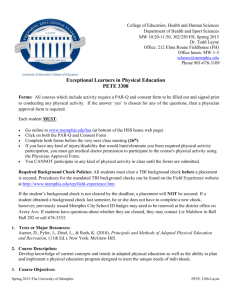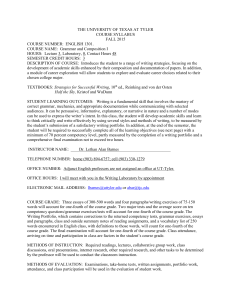Course requirements - Black Hills State University
advertisement
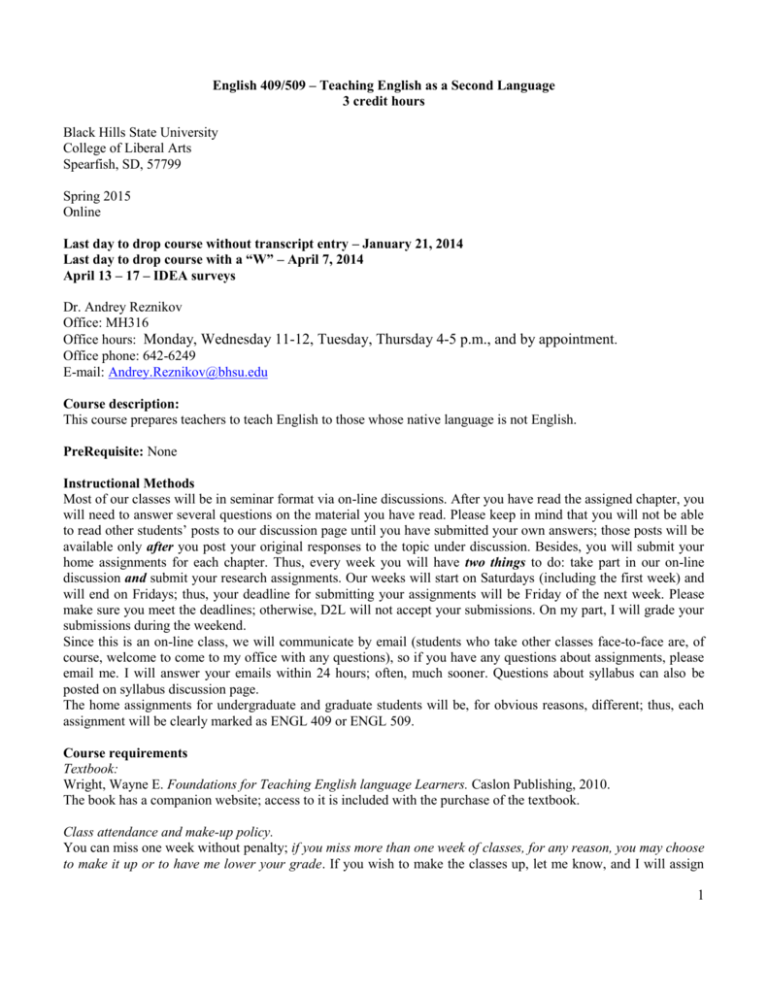
English 409/509 – Teaching English as a Second Language 3 credit hours Black Hills State University College of Liberal Arts Spearfish, SD, 57799 Spring 2015 Online Last day to drop course without transcript entry – January 21, 2014 Last day to drop course with a “W” – April 7, 2014 April 13 – 17 – IDEA surveys Dr. Andrey Reznikov Office: MH316 Office hours: Monday, Wednesday 11-12, Tuesday, Thursday 4-5 p.m., and by appointment. Office phone: 642-6249 E-mail: Andrey.Reznikov@bhsu.edu Course description: This course prepares teachers to teach English to those whose native language is not English. PreRequisite: None Instructional Methods Most of our classes will be in seminar format via on-line discussions. After you have read the assigned chapter, you will need to answer several questions on the material you have read. Please keep in mind that you will not be able to read other students’ posts to our discussion page until you have submitted your own answers; those posts will be available only after you post your original responses to the topic under discussion. Besides, you will submit your home assignments for each chapter. Thus, every week you will have two things to do: take part in our on-line discussion and submit your research assignments. Our weeks will start on Saturdays (including the first week) and will end on Fridays; thus, your deadline for submitting your assignments will be Friday of the next week. Please make sure you meet the deadlines; otherwise, D2L will not accept your submissions. On my part, I will grade your submissions during the weekend. Since this is an on-line class, we will communicate by email (students who take other classes face-to-face are, of course, welcome to come to my office with any questions), so if you have any questions about assignments, please email me. I will answer your emails within 24 hours; often, much sooner. Questions about syllabus can also be posted on syllabus discussion page. The home assignments for undergraduate and graduate students will be, for obvious reasons, different; thus, each assignment will be clearly marked as ENGL 409 or ENGL 509. Course requirements Textbook: Wright, Wayne E. Foundations for Teaching English language Learners. Caslon Publishing, 2010. The book has a companion website; access to it is included with the purchase of the textbook. Class attendance and make-up policy. You can miss one week without penalty; if you miss more than one week of classes, for any reason, you may choose to make it up or to have me lower your grade. If you wish to make the classes up, let me know, and I will assign 1 reading and writing equivalent to 150 minutes for every class you wish to make up. You will have two weeks to make up work for a missed class. Please understand that all absences are excused equally, and all absences have to be made up equally. Students excuse themselves from class, and any excuse is valid if the student says it is. At the same time, only academic work deserves college credit, so absences will have to be made up with academic work that substitutes the missed class. This policy also applies to university-sponsored activities. The point of the policy is to allow you to make choices about your attendance but allow me to maintain the integrity of the course and of a college credit. Finally, there is a limit on your make-up work; if you miss five weeks or more, you cannot pass the class. Academic Dishonesty/Plagiarism Cheating and other forms of academic dishonesty run contrary to the purpose of higher education and will not be tolerated in this course. Academic dishonesty includes (but is not limited to) plagiarism, copying answers or work done by another student (either on an exam or on out-of-class assignments), allowing another student to copy from you, and using unauthorized materials during an exam. Academic dishonesty is a serious offense and could result in failure on an assignment or course. To the extent possible, all incidents will be resolved in discussions between the student and faculty member. As necessary, the chair and then the dean may become involved to resolve the issue. If academic dishonesty is established, a report describing the incident and its resolution will be filed in the offices of the dean and provost. In cases where a satisfactory outcome is not achieved through this process, students may appeal to the University’s Academic Appeals Committee. Formal procedures for filing a complaint for academic misconduct are in the Student Conduct Code in the Student Handbook. Cheating and plagiarism are defined in Section 2, Part B, 1. Disciplinary sanctions are outlined in Section 3, Judicial Policies. Course goals: The course provides a comprehensive introduction to the profession of teaching English to speakers of other languages. Student Learning Outcomes: Students should complete the course with a comprehensive knowledge of methods, skills, and factors necessary for a successful TESOL instruction. Thus, students will be able to: Compare and contrast past and present teaching approaches, Discuss the background on and evaluate various techniques for teaching language skills, Apply various options for integrating the skills, Evaluate important learner factors, and Practice using information that is essential for classroom teacher’s everyday performance and professional growth. Evaluation procedure I use the following scale for grading: A= 90-100, excellent work for college level (exceptional) B= 80-89, good work for college level (above average) C=70-79, competent work for college level (average) D= 60-69, below competent work for college level (lowest passing grade) F= 59 (and below), failing work for college level (failure) Components: 1. Class participation (discussion) – 30 % 2. Home assignments – 30% 3. Mid-term exam – 20 % 4. Final exam – 20% 2 Freedom in Learning Under Board of Regents and University policy student academic performance may be evaluated solely on an academic basis, not on opinions or conduct in matters unrelated to academic standards. Students should be free to take reasoned exception to the data or views offered in any course of study and to reserve judgment about matters of opinion, but they are responsible for learning the content of any course of study for which they are enrolled. Students who believe that an academic evaluation reflects prejudiced or capricious consideration of student opinions or conduct unrelated to academic standards should contact the chair of the department in which the course is being taught to initiate a review of the evaluation. Americans with Disabilities Statement Reasonable accommodations, as arranged through the Disabilities Services Coordinator, will be provided students with documented disabilities. Contact the BHSU Disabilities Services Coordinator, Mike McNeil, at 605-642-6099 (Woodburn 134), fax number 605-642-6095, or via email at mike.mcneil@bhsu.edu for more information. Additional information can also be found at: http://www.bhsu.edu/StudentLife/Learning/DisabilityServices/tabid/162/Default.aspx Tentative outline (subject to change) January 10–16 Who Are English Language Learners (ELLs) (1-22) January 17–23 Second Language Learning and Teaching (23-50) January 24–30 Second Language Learning and Teaching (23-50) (contd.) January 31 – 6 Language and Education Policy for ELLs (51-80) February 7–13 Program Models for ELLs (81-110) February 14–20 Assessment (111-140) February 21–27 Listening and Speaking (141-168) Feb. 28– March 6 Reading (169-203) March 9-13 Spring break March 14-20 Midterm exam March 21–27 Writing (204-238) March 28 – April 3 Writing (204-238) (contd.) April 4–10 Content-Area Instruction (239-266) April 11–17 Primary Language Support (267-284) April 18–24 Technology (285-310) April 25 – May 1 Final exam 3
